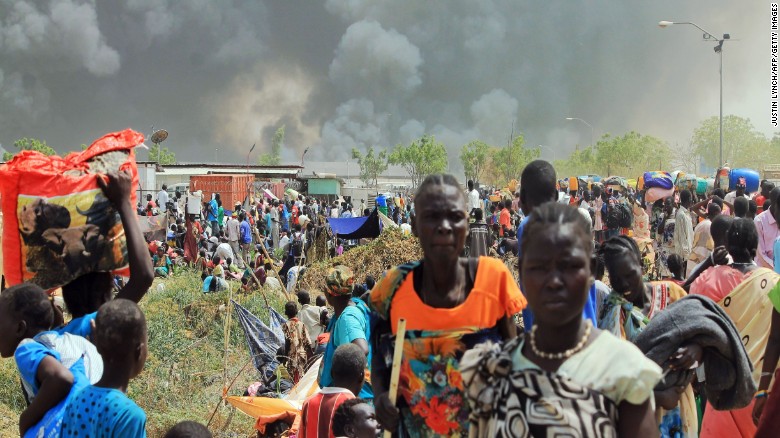Heavy gunfire outside U.N. building in South Sudan

Civilians flee fighting in February when gunmen opened fire at a U.N. camp.
Gunfire from "heavy weaponry" was exchanged outside a United Nations building on the outskirts of South Sudan's capital Juba on Sunday, in fresh violence after a day of relative calm, the U.N. mission to the country said.
The mission sent out a series of tweets at about 8:25 a.m. (1:25 a.m. ET) describing "gunshots" and a "heavily armed exchange" outside a U.N. compound.
Gunshots, heavily armed exchange UN House area once again; going on now since approx. 08:25 @unmissmedia
The weekend violence erupted when President Salva Kiir and Vice President Riek Machar were meeting to discuss previous clashes between their forces. Outside the presidential compound where the meeting took place, a gunbattle kicked off.
Sustained clash, ongoing since approx. 08:25 heavy weapons, UN House area @unmissmedia
Pockets of violence broke out on Thursday evening and by Friday, soldiers loyal to Kiir exchanged heavy gunfire with others backing Machar, in a bloody skirmish that left almost 150 people dead by Saturday, according to Machar's spokesman, James Gatdet Dak. CNN has been unable to independently verify the exact death toll.
 Shots fired at US embassy vehicles in South Sudan
Shots fired at US embassy vehicles in South Sudan"South Sudan today marked the most horrifying Independence Day in the world this year," Dak wrote in a post on Facebook.
It appeared that calm had been restored by late Saturday, but Sunday's gunfire showed tensions are still stirring.
Helicopters, gunships, tanks
The U.N. Security Council in a statement on Saturday strongly condemned the days of violence, which also saw U.N. and diplomatic officials targeted. It called on the transitional government "to quickly investigate these attacks, take steps to end the fighting, reduce tensions, and hold those responsible for the attacks to account." It also confirmed an investigation committee had been formed.
The statement emphasized the importance of command and control and called on the warring factions and "armed actors" to allow the U.N. mission and humanitarian organizations to access civilians in need.

A U.N. base was attacked earlier this week.
"We heard heavy artillery fire at the U.N. (base), and that continued for about an hour or so and then stopped. It was coming form the outer perimeters of the compound," said Shantal Persaud, acting spokeswoman for the U.N. mission.
Helicopter gunships were seen in the sky, and tanks rumbled through the streets. Under the peace deal, both government and opposition troops were stationed in Juba, a plan which many criticized because it put both forces in close proximity.
Command-and-control breakdown
"What we may be seeing is a total breakdown of command and control in Juba," said Kate Almquist Knopf, director of the Africa Center for Strategic Studies. "We need to watch carefully for whether a cycle of reprisal killings by either side begins in the next few days."
Kenya Airways, which operates two flights a day to Juba, said it was suspending all flights to the city because of "uncertain security situation," while Britain's Foreign Office advised against all travel to South Sudan, saying "the security situation in Juba has deteriorated since 7 July."
Two weeks ago, fighting in the western city of Wau between government and opposition troops displaced at least 70,000, according to the United Nations.
The country is nearly out of money because it comes almost exclusively from oil revenue -- the value of which has plummeted in recent years. People have become desperate. In lieu of payment, government soldiers have reportedly been allowed to rape women, a U.N. report said.
South Sudan gained independence in 2011 after 98% of the population voted to break away from Sudan. The East African nation, the youngest country in the world, quickly fell into civil war that took on ethnic undertones.
In December 2013, soldiers from Kiir's Dinka ethnic group tried to disarm Nuer soldiers perceived to be loyal to Machar. Soldiers targeted Nuer civilians in the ensuring fighting, Human Rights Watch says.
The ensuing civil war was gruesome -- at least 50,000 were killed, more than 2 million displaced, and nearly 5 million people faced severe food shortages. Under a peace deal signed in August, Kiir is the president of the country and Machar is the first vice president, but it hasn't stopped fighting.

Comments
Post a Comment